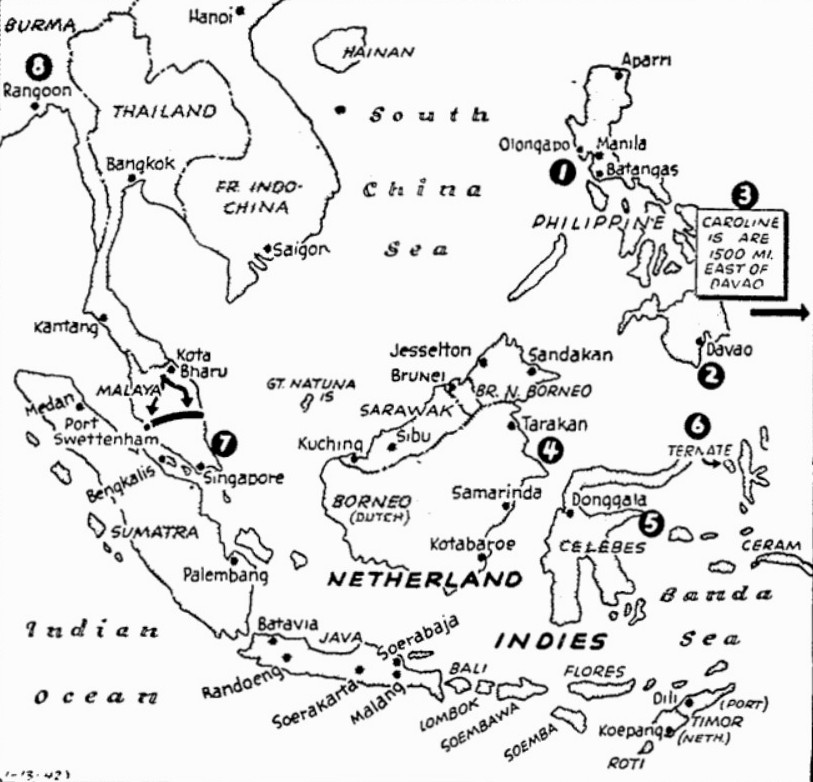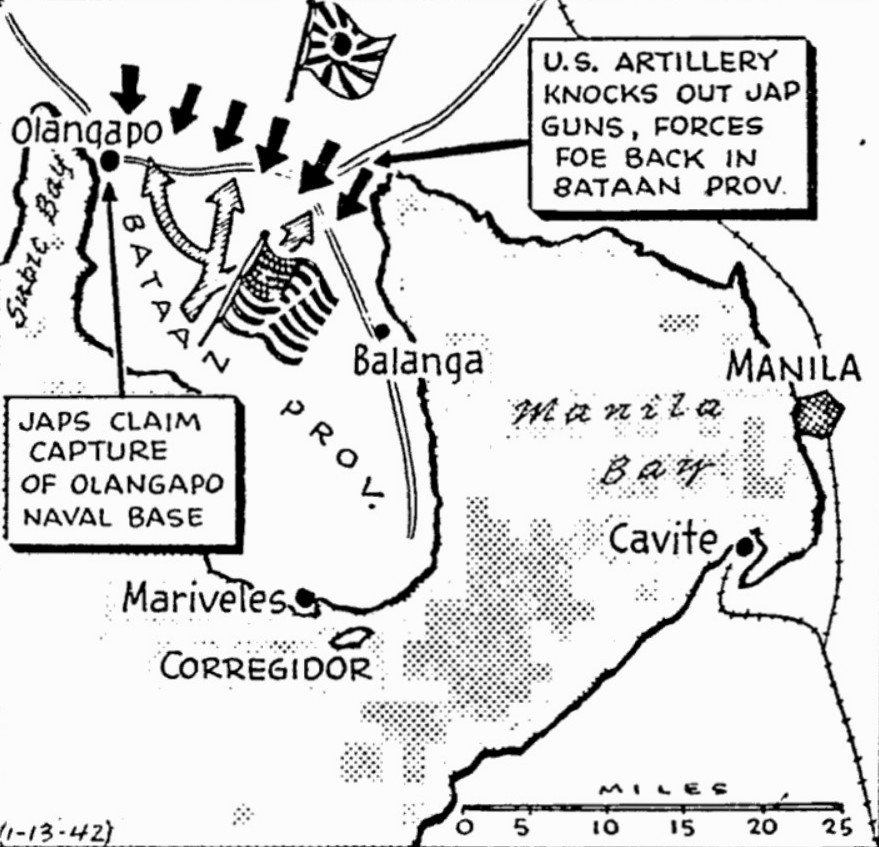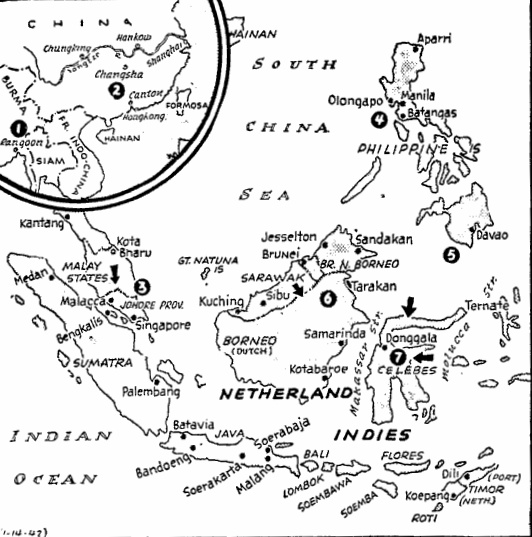Nelson appointed generalissimo of U.S. war output
Authority centralized in key production board as move to spur drive on Axis
Washington (UP) –
Donald M. Nelson, America’s new war production and procurement chief, declared today his aim is to produce enough war weapons to whip Germany and Japan “in the shortest possible time.”
In letters to Office of Production Management Director General William S. Knudsen, Under Secretary of War Robert P. Patterson and Under Secretary of the Navy James V. Forrestal, Mr. Nelson said that any organizational changes needed to “lick Hitler and the Japs” will be made.
The present defense production setup, he said, “must and will evolve into the most effective possible instrument to do it.”
Given free reign
White House Secretary Stephen T. Early had previously disclosed that Mr. Nelson would be permitted to write his own ticket in establishing the sort of organization he desires. The actual drafting of the presidential order creating the new agency is being delayed until Mr. Nelson works out the details.
Nelson’s letter to his colleagues in the government concerned with production was short and to the point:
We have just one job to do – to make enough war material to lick Hitler and the Japs, and to do it in the shortest possible time.
Any organizational changes that have to be made in order to do this job will be made. The present organization must and will evolve into the most effective possible instrument to do it.
Everyone connected with production and procurement, in all agencies of the government, must carry on with the utmost devotion and energy.
May abandon OPM
Mr. Nelson’s assertion was believed to foretell abandonment of the OPM as a distinct entity.
Mr. Patterson and Mr. Forrestal have been representing Secretary of War Stimson and Secretary of the Navy Knox at the OPM’s regular weekly meetings.
Mr. Roosevelt said yesterday that Mr. Nelson, as board chairman, would have “final” say on all questions of procurement and production.
Mr. Early said he had no knowledge of reports that Mr. Nelson might head a supreme Allied Supply Council. There has been considerable speculation that such an organization is in the making.
Senator praises Nelson
Senator Tom Connally (D-TX) praised Mr. Nelson as the “strongest man” in the defense organization. He said that if Mr. Nelson is given administrative authority:, “I’m sure he will see that production gets going.” Mr. Connally interrupted a Senate speech by Senator Alexander Wiley (R-WI), who called for national unity and asked that there be “no buck-passing spree” in the war effort.
Mr. Nelson, former Chicago mail-order house executive, and Lord Beaverbrook, Great Britain’s Minister of Supply, would presumably be the most important members of that council.
President Roosevelt announced last night that Mr. Nelson will be named chairman and responsible director of a new War Production Board which will set up soon to replace the present Supply Priorities and Allocations Board which took the top defense production spot from the Office of Production Management last August.
The War Production Board parallels creation of the World War Industries Board which was headed by Bernard M. Baruch.
Mr. Nelson’s new job will place him in a position comparable to the one held by Lord Beaverbrook. Some sources said the grant of power contemplated for the new production czar would make him a virtual Minister of Supply and place him “head and shoulders” above any other official in the government except Mr. Roosevelt.
Appointment hailed
Many observers believed that Mr. Nelson might be made the head of the new Allied Supply Council – even over Lord Beaverbrook. That speculation was based on belief that an American would be chosen to head such an organization because of the United States’ dominant place in the war production picture.
The choice of Mr. Nelson ends many months of criticism of Mr. Roosevelt’s production setup.
Congressmen hailed his appointment as a “long step forward” in our production effort. Vice President Henry A. Wallace, who will serve on the new board, thought it was “a perfectly grand setup – one we have been parrying for all the time.”
Blanket authority
Even Lord Beaverbrook, who came to this country with British Prime Minister Churchill and is still conferring with war production leaders, had criticized the American program, complaining that there was no central production and procurement agency in this country where joint Anglo-American supply problems could be discussed.
Others have been denouncing the pattern and accomplishments of the Office for Emergency Management, top “holding company” in the administration’s production and procurement pyramid, under which SPAB, OPM and the Army and Navy procurement branches functioned without clear definition.
Mr. Nelson’s appointment appears to answer those critics.
We will have full and binding authority over granting of contracts, the production of raw materials and finished munitions, and the methods and procedure of all war procurement.
Can cut red tape
The new board is believed to follow lines that Mr. Nelson, as Executive Director of SPAB, has been urging for weeks. It was understood that the present system of procurement, production and awarding contracts would continue, but that Mr. Nelson would now be able to step in to cut red tape and speed up work in situations inimical to the production program.
The President’s announcement was unexpected. In fact, the dead cats were still flying and at least one was caught in the air. Wendell L. Willkie, the 1940 Republican presidential candidate who conferred with the President at the White House yesterday, had prepared a speech for delivery last night to the U.S. Conference of Mayors. He modified it after Mr. Nelson’s appointment, indicating that he had not been informed of the move during his White House visit.
Knudsen cancels talk
OPM Director William S. Knudsen, who will now answer to Mr. Nelson, had planned a radio address last night, but called it off. Mr. Knudsen and Mr. Nelson, however, are good friends and it was rumored that the OPM leader may be given a new production job.
The President’s assertion that Mr. Nelson’s “decision as to questions of procurement and production will be final,” places control in civilian hands of the Army and Navy’s procurement programs. As OPM Purchasing Director, Mr. Nelson revised quartermaster procurement policies to avert collision with civilian markets through application of “mail-order house technique” – which he acquired in his former duties with Sears, Roebuck & Co.
No new faces
As armament procurement and production chief, Mr. Nelson will assume command of President Roosevelt’s new all-out war program which calls for delivery this year of 60,000 airplanes, 45,000 tanks and 20,000 anti-aircraft guns. Much of the contemplated $56-billlion expenditure for the war effort for fiscal year 1943 will come under his direction.
There are no new faces in the President’s fourth organization to run war production. Other members of the new board will be the present members of SPAB – Mr. Wallace, Mr. Knudsen, OPM Codirector Sidney Hillman, Secretary of War Stimson, Secretary of the Navy Knox, Price Administrator Leon Henderson, special assistant to the President Harry Hopkins and Federal Loan Administrator Jesse Jones.
Roosevelt announcement
It was believed that Mr. Nelson would call principally upon OPM personnel to direct the new board’s work. However, the organizational status of OPM remains uncertain pending issuance of the new executive order.
The President’s announcement said:
By executive order, I will establish a War Production Board which will be granted the powers now exercised by the Supply Priorities and Allocations Board.
I will appoint Donald Nelson as chairman… in addition… he will be charged with the direction of the production program and have general supervision over all production agencies. His decisions as to questions of procurement and production will be final.
Mr. Nelson will report to the President as to the progress of the program. He will no longer serve as director of the Priorities Division but will devote his entire time to directing the production program.
Vice President Wallace, as chairman of the Economic Defense Board, will serve as a member of the War Production Board as will the other members of SPAB.



